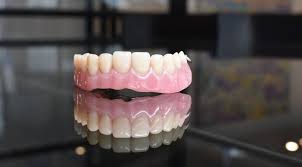If you are considering dentures as a solution for missing teeth, you may have questions about the process. Understanding what to expect when getting dentures can help ease any concerns and ensure a smooth transition. Dentures are custom-made dental appliances that replace missing teeth and restore your smile. The process of getting Teeth Dentures involves several steps, each designed to ensure a comfortable, secure, and natural-looking fit.
Initial Consultation: The First Step Toward New Teeth
The journey to getting dentures begins with a consultation with your dentist. During this appointment, your dentist will evaluate your oral health, discuss your specific needs, and determine if dentures are the right choice for you.
- Examination: Your dentist will thoroughly examine your mouth, gums, and remaining teeth (if any) to assess your oral health.
- X-rays and Impressions: To create a precise model of your mouth, your dentist may take X-rays and impressions of your gums and jaw. This helps in crafting dentures that fit comfortably and function properly.
- Discussion of Options: Your dentist will explain the different types of dentures available (full, partial, or implant-supported) and recommend the best option based on your needs.
Designing Your Custom Dentures:
Once your dentist has all the necessary information, the next step is designing your custom dentures. This stage is critical for ensuring the final product meets both functional and aesthetic requirements.
- Personalized Measurements: To achieve the best fit, your dentist will take measurements of your jaw, the shape of your mouth, and the alignment of your teeth. These measurements help create dentures that fit securely and look natural.
- Choosing Materials and Color: Your dentist will help you select the right materials for your dentures, which can range from acrylic to porcelain. The color of your dentures will be matched to your natural teeth to create a seamless smile.
- Crafting the Dentures: Once the design is complete, the information is sent to a dental laboratory where your dentures will be crafted. This process usually takes a few weeks.
Fitting and Adjustments: Ensuring Comfort and Function
After your dentures are made, you will return to your dentist for a fitting. This is an essential step to ensure that your dentures fit comfortably and function properly.
- Initial Fitting: When you try on your dentures for the first time, your dentist will check how they fit in your mouth. You may feel some tightness or discomfort initially, but this is normal.
- Adjustments: Your dentist will make any necessary adjustments to ensure your dentures fit properly. They may make slight modifications to improve comfort, correct bite issues, or address any soreness in the gums.
- Practice Speaking and Eating: During the fitting, your dentist will also help you practice speaking and eating with your new dentures. This may feel awkward at first, but with time and practice, you will become accustomed to them.
Getting Used to Your New Dentures:
Adjusting to new dentures takes time, as your mouth needs to become accustomed to the new appliance. While some people adjust quickly, others may experience mild discomfort or difficulty eating and speaking.
- Initial Discomfort: It’s common to experience some soreness or irritation as your gums adjust to the dentures. This discomfort should subside after a few days or weeks.
- Learning to Speak and Eat: You may notice that speaking or chewing feels different. Start with soft foods and practice speaking in front of a mirror to help your body adjust.
- Gradual Adjustments: Over time, your dentures may require further adjustments as your mouth changes. Regular visits to your dentist will help ensure that your dentures remain comfortable and functional.
Ongoing Care and Maintenance of Your Dentures:
Once you’ve gotten used to your dentures, it’s important to care for them properly to ensure their longevity and maintain oral health. Proper maintenance will keep your dentures looking good and functioning well.
- Daily Cleaning: Clean your dentures after every meal to remove food particles and plaque. Use a soft-bristled brush and non-abrasive cleanser to avoid damaging the dentures.
- Soaking Overnight: Soak your dentures in water or a special denture solution overnight to prevent them from drying out or losing shape.
- Regular Check-ups: Regular dental check-ups are essential for monitoring the condition of your dentures and ensuring that they fit properly. Your dentist will also check the health of your gums and remaining teeth.
When to Consider Denture Replacements or Repairs?
Over time, Teeth Dentures may need to be replaced or repaired due to normal wear and tear. Understanding when to seek repairs or replacements is important for maintaining the comfort and functionality of your dentures.
- Signs of Wear: If your dentures show signs of wear, such as cracks or chips, it’s essential to have them repaired to avoid further damage.
- Loose Fit: As your gums and jawbone change, your dentures may become loose. If you notice your dentures slipping or causing discomfort, it may be time for adjustments or replacement.
- Regular Updates: Your dentist will assess your dentures during check-ups and recommend replacements if necessary to ensure a proper fit and restore functionality.
In conclusion, getting dentures involves several important steps, from the initial consultation to the final fitting and ongoing care. By following the proper procedures and working closely with your dentist, you can ensure that your dentures provide comfort, functionality, and a beautiful smile. Patience and regular follow-ups will help you get the most out of your new dentures and improve your overall quality of life.

